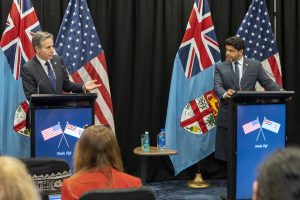Last week, U.S. Secretary of State Antony Blinken was in Fiji, the first such visit by a U.S. secretary of state in 36 years. The visit came on the back of a meeting of the Quad partners — the U.S., Australia, India, and Japan — in Melbourne, Australia. Despite ongoing tension in Ukraine, these visits were designed to demonstrate Washington’s commitment and focus on the Indo-Pacific region. The trip to Fiji to meet with Pacific Island leaders was an especially important signal that the United States plans to bolster its presence in the Pacific.
Of course, the U.S. already has a significant presence within Micronesia. But negotiations for renewed Compacts of Free Association with the Marshall Islands, Federated States of Micronesia (FSM), and Palau remain stalled. The current arrangements are set to expire in 2023 for the Marshall Islands and FSM, and 2024 for Palau. As Patricia O’Brien recently wrote in The Diplomat, the future relationships between the U.S and these three states “touches on every priority area for the Biden administration” and therefore should be considered a priority.
Within Polynesia and Melanesia, Washington has allowed its allies in Australia and New Zealand to take the lead in diplomatic engagement over the past few decades. The U.S. has often downgraded its diplomatic presence, closing embassies in order to redirect its resources to other regions of the world. Presently the U.S. has only three embassies within these two regions. This has demonstrated Washington’s trust in Canberra and Wellington, but also left a superpower-sized hole that China has been working towards filling in the Pacific Island states themselves.
The first specific demonstration of Washington’s renewed commitment will be the reopening of the U.S Embassy in the Solomon Islands. The U.S. downgraded its embassy to a consulate in the Solomon Islands in 1993. Given that the Solomon Islands switched its diplomatic recognition from Taiwan to China in 2019, and Chinese activity in the country is one of many factors in recent instability in the country, Washington has clearly become far more interested.
A concern in the region is that Washington views the Pacific solely through the lens of competition with China, and thus the United States’ own security interests will take precedence. The relationships will simply become transactional. The regional worry is that Washington will fail to value these countries on their own merits, only viewing them in terms of how they can be used as a tool in the U.S. strategy to counteract Chinese influence.
Pacific Island countries are wary of becoming involved in any great power rivalries, but have had this competition projected onto them regardless. Yet at the same time Pacific Island leaders have found canny ways to use this competition to their own advantage, in particular, using the competitive situation to address their significant and unique infrastructure needs. A renewed U.S. presence in the region is likely to exacerbate and complicate competition with China, but also be a welcome addition to Pacific countries in need of development assistance.
What the Pacific will be hoping for is a genuine commitment to assist them to build greater climate resilience. At his joint press conference with Blinken, acting Fijian Prime Minister Aiyaz Sayed-Khaiyum made it clear that climate change was the central issue of concern in the region. Pacific Island countries are responsible for a negligible amount of carbon emissions, but disproportionately feel the effects of climate change. Larger powers have a responsibility not only to reduce their own emissions, but also to help countries which are bearing the costs.
Being serious about addressing the effects of climate change, and seeking to mitigate further damage to the environment, is essential to being able to win the trust of Pacific Islands. Australia continues to undermine much of the good work it does in the Pacific, and the significant cultural bonds it has in the region, due to its disinterest in pivoting away from coal. Washington should be wary of simply ignoring Pacific concerns in the manner that Canberra has.
The Trump administration leaving the Paris Agreement was deeply distressing to the region, given both the size of U.S emissions and the essential U.S leadership required on the issue. The Biden administration’s return to the agreement has been welcomed. However, the fear within the Pacific will now be that Washington’s commitment to addressing climate change is dependent on which party holds power in Washington.
Blinken’s visit to Fiji was obviously a major event for a region unaccustomed to visits by such powerful figures. It is also quite obvious that without the continued growth and international reach of China such a visit may never have occurred. The hope in the Pacific is that although China brought the region back onto Washington’s agenda, Beijing isn’t the only regional issue the Americans will be concerned with.

































